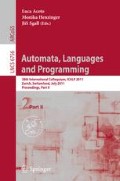Abstract
We consider the problem of establishing a relationship between two interpretations of base type terms of a λ c -calculus with algebraic operations. We show that the given relationship holds if it satisfies a set of natural conditions. We apply this result to comparing interpretations of new name creation by two monads: Stark’s new name creation monad [25] and a global counter monad.
Access this chapter
Tax calculation will be finalised at checkout
Purchases are for personal use only
Preview
Unable to display preview. Download preview PDF.
References
Benton, N., Hughes, J., Moggi, E.: Monads and effects. In: Barthe, G., Dybjer, P., Pinto, L., Saraiva, J. (eds.) APPSEM 2000. LNCS, vol. 2395, pp. 42–122. Springer, Heidelberg (2002)
Filinski, A.: Representing monads. In: Proc. POPL 1994, pp. 446–457 (1994)
Filinski, A.: Controlling Effects. PhD thesis, Carnegie Mellon University (1996)
Filinski, A.: Representing layered monads. In: Proc. POPL 1999, pp. 175–188 (1999)
Filinski, A.: On the relations between monadic semantics. Theor. Comput. Sci. 375(1-3), 41–75 (2007)
Filinski, A., Støvring, K.: Inductive reasoning about effectful data types. In: Hinze, R., Ramsey, N. (eds.) ICFP, pp. 97–110. ACM, New York (2007)
Girard, J.-Y.: Linear logic. Theor. Comp. Sci. 50, 1–102 (1987)
Hasegawa, M., Kakutani, Y.: Axioms for recursion in call-by-value. Higher-Order and Symbolic Computation 15(2-3), 235–264 (2002)
Hermida, C.: Fibrations, Logical Predicates and Indeterminants. PhD thesis, University of Edinburgh (1993)
Jacobs, B.: Categorical Logic and Type Theory. Elsevier, Amsterdam (1999)
Katsumata, S.: A semantic formulation of ⊤ ⊤-lifting and logical predicates for computational metalanguage. In: Ong, L. (ed.) CSL 2005. LNCS, vol. 3634, pp. 87–102. Springer, Heidelberg (2005)
Katsumata, S.: A characterisation of lambda definability with sums via ⊤ ⊤-closure operators. In: Kaminski, M., Martini, S. (eds.) CSL 2008. LNCS, vol. 5213, pp. 278–292. Springer, Heidelberg (2008)
Larrecq, J.-G., Lasota, S., Nowak, D.: Logical relations for monadic types. Math. Struct. in Comp. Science 18, 1169–1217 (2008)
Lindley, S.: Normalisation by Evaluation in the Compilation of Typed Functional Programming Languages. PhD thesis, University of Edinburgh (2004)
Lindley, S., Stark, I.: Reducibility and ⊤ ⊤-lifting for computation types. In: Urzyczyn, P. (ed.) TLCA 2005. LNCS, vol. 3461, pp. 262–277. Springer, Heidelberg (2005)
Melliès, P.-A., Vouillon, J.: Recursive polymorphic types and parametricity in an operational framework. In: LICS, pp. 82–91. IEEE Computer Society, Los Alamitos (2005)
Mitchell, J.: Representation independence and data abstraction. In: Proc. POPL 1986, pp. 263–276 (1986)
Mitchell, J.: Foundations for Programming Languages. MIT Press, Cambridge (1996)
Mitchell, J., Scedrov, A.: Notes on sconing and relators. In: Martini, S., Börger, E., Kleine Büning, H., Jäger, G., Richter, M.M. (eds.) CSL 1992. LNCS, vol. 702, pp. 352–378. Springer, Heidelberg (1993)
Parigot, M.: Proofs of strong normalisation for second order classical natural deduction. Journal of Symbolic Logic 62(4), 1461–1479 (1997)
Pitts, A.: Parametric polymorphism and operational equivalence. Mathematical Structures in Computer Science 10(3), 321–359 (2000)
Plotkin, G., Power, J.: Semantics for algebraic operations. Electr. Notes Theor. Comput. Sci. 45 (2001)
Plotkin, G.D., Pretnar, M.: Handlers of algebraic effects. In: Castagna, G. (ed.) ESOP 2009. LNCS, vol. 5502, pp. 80–94. Springer, Heidelberg (2009)
Simpson, A., Plotkin, G.: Complete axioms for categorical fixed-point operators. In: LICS, pp. 30–41 (2000)
Stark, I.: Categorical models for local names. Lisp and Symbolic Computation 9(1), 77–107 (1996)
Stark, I.: A fully abstract domain model for the π-calculus. In: Proc. LICS 1996, pp. 36–42. IEEE, Los Alamitos (1996)
Author information
Authors and Affiliations
Editor information
Editors and Affiliations
Rights and permissions
Copyright information
© 2011 Springer-Verlag Berlin Heidelberg
About this paper
Cite this paper
Katsumata, Sy. (2011). Relating Computational Effects by ⊤ ⊤-Lifting. In: Aceto, L., Henzinger, M., Sgall, J. (eds) Automata, Languages and Programming. ICALP 2011. Lecture Notes in Computer Science, vol 6756. Springer, Berlin, Heidelberg. https://doi.org/10.1007/978-3-642-22012-8_13
Download citation
DOI: https://doi.org/10.1007/978-3-642-22012-8_13
Publisher Name: Springer, Berlin, Heidelberg
Print ISBN: 978-3-642-22011-1
Online ISBN: 978-3-642-22012-8
eBook Packages: Computer ScienceComputer Science (R0)

